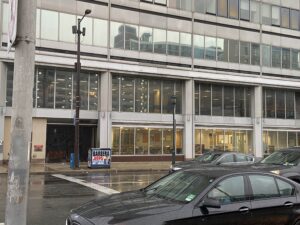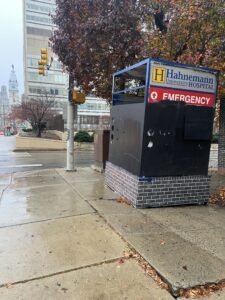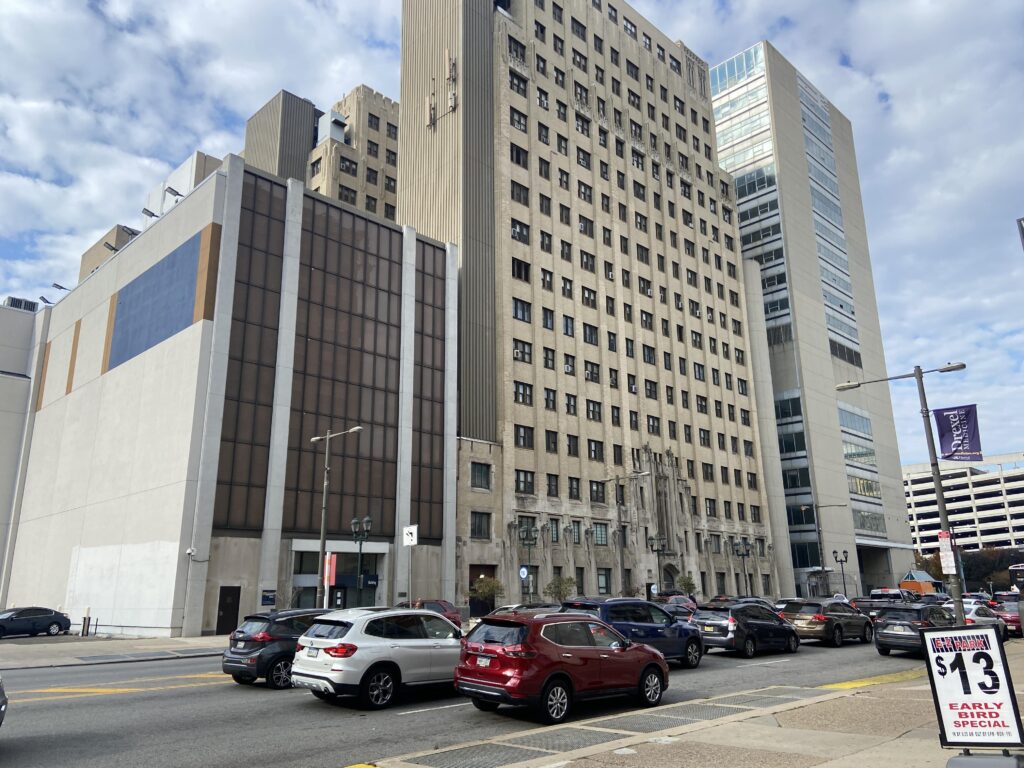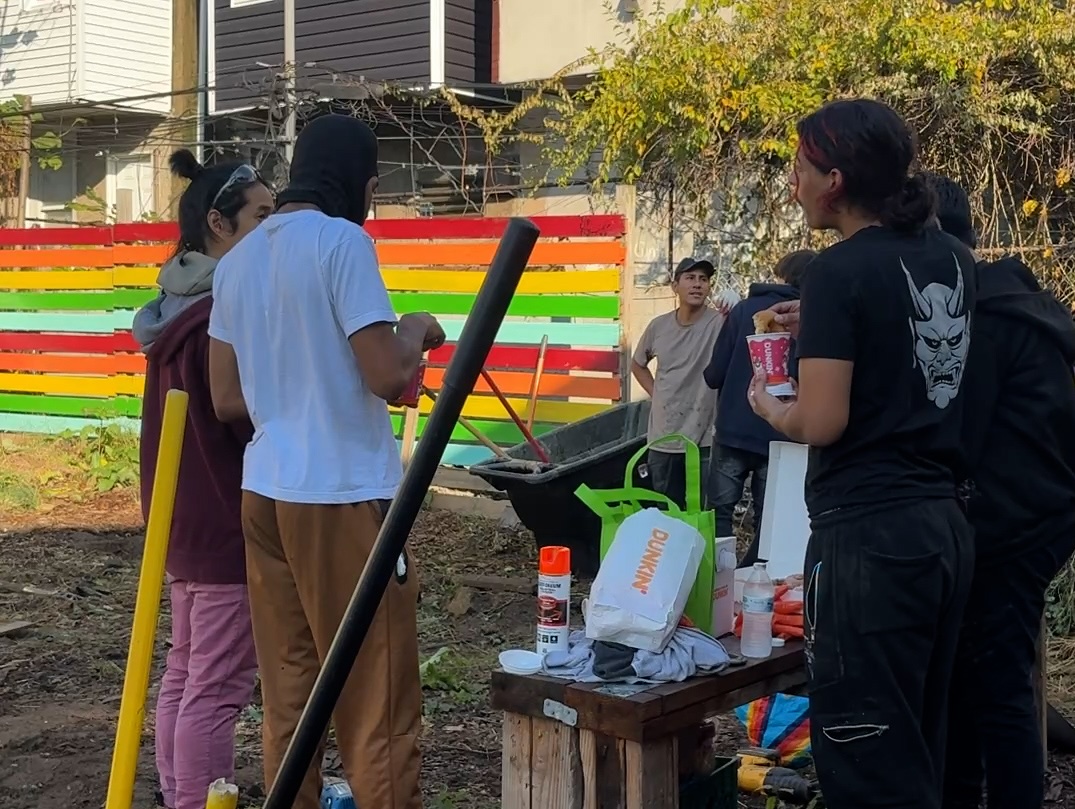(PHILADELPHIA) – If you walk along North Broad Street in Center City, Philadelphia, the building that was once Hahnemann University Hospital may look out of place with its early 20th-century architecture, faded windows, and chipped paint on all of the entrances. But it wasn’t always this way. Just five years ago, this empty building was a center of activity with ambulances rushing in; patients, doctors, nurses, and visitors darting in and out; and the constant din of traffic and sirens.
After several transfers of ownership and “unsustainable financial losses,” Hahnemann University Hospital closed in June 2019. Since then, it has looked more like a scene from the HBO post-apocalyptic series The Last of Us — entirely abandoned, with a zoning notice from the city on the door, a vacant waiting room, and empty hospital beds.
Philadelphia is known as a hub for medicine, specifically for medical students who study at the prestigious campuses of Temple, Jefferson, University of Pennsylvania, and Drexel. Hahnemann was not only a place where low-income Philadelphians could get affordable care, it also provided an emergency-room training ground for students in the heart of the city.
What’s left now is an empty building that luxury developers are eyeing along modernized North Broad Street. Former patients are in cleaner facilities receiving good treatment, but it can’t make up for Hahnemann being right there when they needed it most.

Lights on, but no one inside: Hahnemann’s empty waiting area. [Credit: Genevieve Hartnett]
Throughout its 150 years of operation, Hahnemann University Hospital was a 19th-century cultural landmark. Over time it went through a series of owners. Allegheny Health Systems bought Hahnemann and St. Christopher’s Hospital in the 1990s. Tenet Healthcare then took over ownership of the hospital in 2008 until it was bought in 2018 by American Academic Health System, a for-profit firm owned by California businessman Joel Freedman.
A Level One Trauma facility located between the Callowhill and Spring Garden neighborhoods, Hahnemann served predominantly Black and Latino patients in a city where those two demographics are the majority.
Even as the transfers of ownership caused problems with the building’s physical shell, those who worked there and lived nearby attest to a strong sense of community that kept the hospital afloat.
Dr. Nafisa Hasan, a podiatrist who now has a private practice in Philadelphia’s Rittenhouse Square, completed her residency at Hahnemann from 2011 to 2014.
“I can only describe my experience at Hahnemann as magical,” said Hasan. “Since it was a teaching institution, it was such a central part of Philadelphia. The patients we saw came from all backgrounds, and the people who trained at Hahnemann saw the worst of the worst. But that made the training so good.”
In addition to treating trauma patients, Hahnemann’s emergency room handled other high-stakes cases – like expectant mothers with no health insurance, suffering from drug addiction and cardiac issues, according to Ellen Wolff, a former Hahnemann nurse who now works in Labor and Delivery at Temple University.
Five years later, security guards still keep watch over the building. And every day, they’re forced to turn away patients who still come into the hospital looking for care, said one guard who asked not to be named.

A dilapidated emergency sign for the former hospital with Philadelphia City Hall in the distance. [Credit: Genevieve Hartnett]
Even if patients have access to other facilities within a 10-mile radius, getting care has become more difficult with no centralized medical facility. Temple is a 30-minute subway ride away from Hahnemann, and according to Dr. Darryl Brown, Professor of Health Economics at Drexel University, “Jefferson is far from any subway stop and more in a business district rather than a neighborhood.” Upon the hospital’s closure, many patients and hospital staff were left without nearby care or employment.
“They wanted to relocate me up to the Northeast, but that was just too far for me,” said one patient who used to receive regular shots in her back at Hahnemann and asked not to be named. “So I don’t get any treatment anymore.”
For new mothers, the lack of a central location is not only a loss, it poses challenging logistical issues. “You might go to Einstein or Jefferson for prenatal care and then Temple to deliver,” said Wolff.
“It really was the heart of the city because of its central location,” said Hasan, “I think everyone misses that sense of community and belonging.”
In an op-ed for Academic Medicine, Dr. Richard J. Hamilton writes that in the span of a few weeks, the “Department of Emergency Medicine went from a bustling schoolhouse full of trainees to a decimated department scrambling to find positions elsewhere.”
However, because Hahnemann serviced predominantly low-income patients and adhered to a for-profit structure, it was continually losing money and did not appear to be a strong investment for insurance companies.
“One of the underlying problems is that hospitals like to locate in places where their patients will have good insurance, private insurance,” said Dr. Mark Stehr, Director of the Drexel University School of Economics, “Hospitals in places where people rely on Medicaid programs have trouble making ends meet and are at higher risk for closing since Medicaid reimburses less than private insurance. The result is lower access for the poor.”
Leaving History Behind
Since Hahnemann’s closure, there have been multiple proposals for the property, but they have never reached a final deal.
In May 2020, at the height of the pandemic, the city asked Freedman to open up beds in the closed hospital for COVID-19 patients. Freedman offered to retrofit the hospital at a price of almost $1 million per month from the city, which Mayor Jim Kenney declined. The patients were instead transferred to Temple, Jefferson, and the University of Pennsylvania. Some were even sent out of state.
Though the safety net of Hahnemann University Hospital is gone, there are still medical facilities and testing centers on the northern Center City block. However, Brown told The Click that one of those facilities, Drexel, is looking to consolidate more of its buildings on its campus in University City, west of the Schuylkill River.

Community and history: A mural next to the former hospital. [Credit: Genevieve Hartnett]
Apart from a 7-Eleven convenience store with sun-damaged windows, there are few small businesses and restaurants left near the hospital site. One of the only remnants of a local restaurant is a closed Philly’s Famous Cheesesteaks with a broken neon sign and faded wallpaper inside.
“This area has changed drastically,” said West Philadelphia resident Morgan Fitzgerald who regularly visited North Center City as a young person. “It used to be such a fun shopping area, we used to be able to go out to eat here often.”
The block that holds the Hahnemann University Hospital building has all the markers of an area about to be taken over by a luxury development: spikes to deter people from using the flower beds, empty stores, and only a handful of people around. Residents tend to be transplants who have moved into one of the many surrounding luxury apartment complexes within the last few years.
“We see so much less foot traffic, it’s mostly all from tourists,” said an employee at the Pennsylvania Academy of the Fine Arts (PAFA) gift shop who asked not to be named and used to welcome hospital staff and patients. “Developers in Philly are really relying on tourism from sports, and not the small businesses that make up the heart of the city.”
Just five blocks away from the hospital site is the intended location of 76 Place, the $1.3 billion new arena for the Philadelphia 76ers basketball team. Apollo Global Management, which was part of the sale to Freedman in 2018, is also owned by Josh Harris, managing partner of the Sixers.
Peter Kelsen, a Philadelphia land usage attorney with BlankRome LLC, said this neighborhood has been on developers’ minds since 2015, and they have been modernizing many of the buildings. While the recent spate of inflation slowed them down, developers are preparing to push for more of the luxury housing that bookends the older section now.
Kelsen could not say what will be built at Hahnemann and across the street, but he told The Click, “The expansion will be non-healthcare. Maybe life sciences.”
In December 2023, Race Street Labs, the life science company seated right next to the Hahnemann University Hospital building, started bringing new life science tenants into the refitted space. While this move will draw more jobs and new residents to the neighborhood, it remains to be seen if these developments will ameliorate the current public health emergency in Philadelphia.
In response to the rumor that the building may be turned into luxury apartments, one of the PAFA employees shuddered as they said, “Living in a former hospital. I don’t know if I could ever do that.”
With the sprawl of City Hall and the Pennsylvania Convention Center to the south, and the luxury development of Spring Garden to the north, the block that held Hahnemann Hospital is being squeezed in by gentrification. In its wake is a community still reeling from the loss of this hospital and historic community center.
There are no clear plans about what will happen to the former hospital, only rumors floating around the community. This month marks Philadelphia’s fifth year without Hahnemann. In another five years, these blocks may have new life and different occupants, but for former patients and staff, it will always be the dependable and historic center that provided a safety net in the volatile world of American healthcare.


